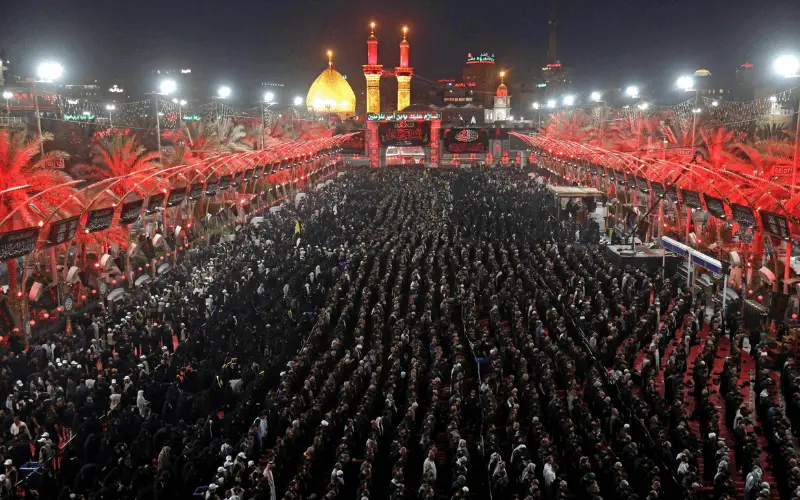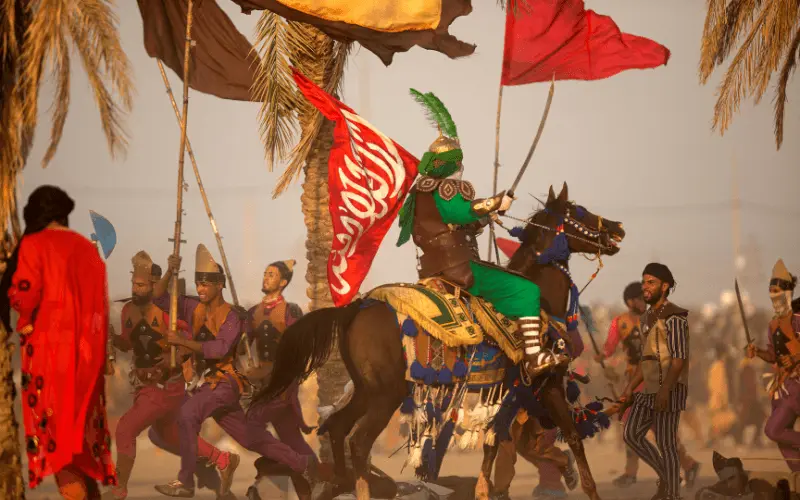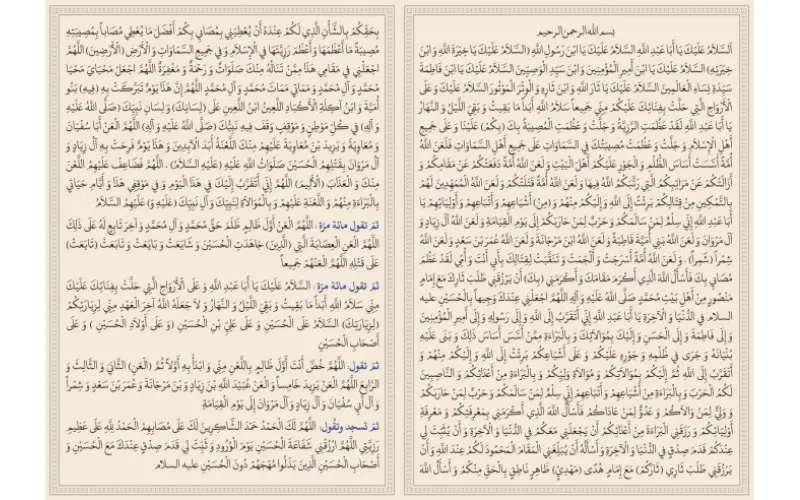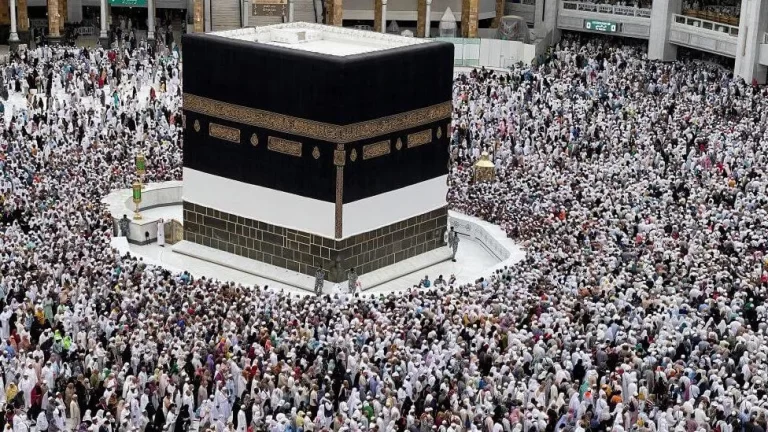Ashura

The Day of Ashura holds great significance in the Islamic calendar, carrying spiritual and historical importance. Certain days in the year are more virtuous than others, one such day is known as the Day of Ashura.
What is Ashura and What is the history and significance of Ashura? That’s what this article is about. It is a detailed guide of Holy Day of Ashura on 10 Muharram. Just ensure you read this article through to the end.
Read other Religious Holidays Guides by daysdiscuss
What’s Ashura?

Day of Ashura is a significant religious observance in Islam, observed on the 10th day of Muharram, the first month of the Islamic lunar calendar.
It commemorates various events depending on the branch of Islam, but most notably the martyrdom of Husayn ibn Ali, the grandson of the Prophet Muhammad, in the Battle of Karbala in 680 CE.
For Shia Muslims, Ashura is a solemn day of mourning, while for Sunni Muslims, it is a day to feel sorrow for Imam Hussain and his companions but also holds historical and religious significance as well, although the observance may differ in practices and interpretations. It’s a time for reflection, and sorrow, and often involves acts of charity and self-discipline.
Now let’s learn about the history and significance of Day of Ashura.
What is the history and significance of Ashura?

1. The Conflict of Karbala
One of the most notable incidents in the month of Muharram was the Battle of Karbala, which occurred in Iraq during the year 61 AH. It involved a small group led by Imam Hussain (AS), the grandson of the Prophet (PBUH), fighting against a much larger army sent by Yazid ibn Muawiyah, the Umayyad Caliph.
The battle occurred because Imam Hussain (AS) refused to support Yazid, who was unjust and had taken control of Muslim leadership after his father’s death.
On the 10th day of Muharram, known as the Day of Ashura, Imam Hussain (AS) was killed by the enemy forces. This day holds great significance as Imam Hussain (AS) and 72 others, mostly from the Prophet’s family, bravely sacrificed their lives to oppose tyranny and uphold Islam.
Imam Hussain (AS) had a special bond with the Prophet (SAW), his beloved grandson. His brutal death during the Battle of Karbala is one of the saddest events in Islamic history.
The significant position of Imam Hussain in Islam is emphasized in the following Hadith:
Al-Hussain is from me and I am from Al-Hussain. Whoever loves Al-Hussain is loved by Allah. (Musnad Ahmad)
2. The Day When Musa was Liberated by Allah
During the Day of Ashura in the era of Prophet Musa (AS), Allah rescued the Prophet and the Children of Israel from the oppressive Pharaoh and his army.
The Pharaoh was mean and unfair when he ruled, and he said he was God, which was wrong. But Prophet Musa (AS) disagreed with him and told him to worship Allah instead. The Pharaoh didn’t want to listen and sent a big army to destroy the Prophet and his friends.
On Day of Ashura, Prophet Musa (AS) and his followers were being followed by the army, but they relied only on Allah to keep them safe.
Prophet Musa (AS) prayed a well-known supplication that was later mentioned in the Holy Quran:
Truly my Lord is with me, He will guide me through.” (Quran 26:62)
Because Prophet Musa (AS) stayed patient and had strong faith in Allah’s assistance, Allah split the Red Sea, allowing him and his followers to cross safely. As a consequence, the Pharaoh and his army were drowned in the sea as a punishment.
Then We inspired Moses, “Strike with your staff the sea,” and it parted, and each portion was like a great towering mountain. And We drew forward the others [i.e., the pursuers]. And We saved Moses and those with him, all together. Then We drowned the others. Indeed that is a sign, but most of them were not to be believers. And indeed, your Lord is the Exalted in Might, the Merciful. (Qur’an | 26:63-68)
3. The Narrative of Ashura and Various Other Prophets
During the era of other prophets like Nuh (AS), the Day of Ashura held significance. According to some accounts, on Ashura, Allah brought Nuh’s ark back to dry land following the end of the flood. It marked a moment of joy and gratitude for the Prophet and his faithful followers.
According to certain accounts, the Day of Ashura is also remembered as the day Prophet Adam (AS) sought forgiveness from Allah after consuming the forbidden fruit.
Additionally, it’s believed to be the day when Prophet Yunus (AS) was freed from the belly of the whale and Allah pardoned his people. On this day Joseph was freed from prison.
Observing the Day of Ashura

In addition to fasting on the day of Ashura, which is highly virtuous, there are numerous other good deeds you can engage in that yield significant rewards on this blessed day.
Other acts of virtue on Ashura involve donating Sadaqah and Zakat to assist those in need globally, along with providing for one’s family by spending money on them.
On Ashura, it’s crucial to enhance acts of worship like reading more Qur’an, sending blessings to the Prophet (PBUH), and engaging in optional prayers. It’s also an opportune moment to ponder over the significant occurrences of Ashura and extract valuable lessons from them. For instance, we learn to trust in Allah’s strength to aid us in times of difficulty.
Ziyarat Ashura and other duaas

The Shi’a Muslim community pays homage to Imam Hussain (AS) and the martyrs of the Battle of Karbala through a reverential prayer known as the Ziyarat Ashura.
Do Muslims Commemorate Ashura in Varying Ways?

For Shi’a Muslims observing Ashura, the occasion is characterized by grief as it commemorates the martyrdom of Imam Hussain (AS) during the Battle of Karbala. Shia orators will impart sermons, narrating the saga of the Battle of Karbala. Additionally, they will evoke the essence of Hazrat Hussain’s life through poetry, emphasizing his noble qualities and virtues.
In numerous regions of Iraq and Iran, large public plays, marches, and processions are held in front of thousands of people who gather to mourn and commemorate the event.
The “passion plays” aim to show how important Hussein’s sacrifice was and to make people feel deeply about fighting for justice.
During Ashura, despite being prohibited in certain areas, some individuals engage in tatbir, a practice involving the use of blades, chains, and other objects to self-flagellate, symbolizing themes of sacrifice and endurance.
In Muharram, Shia followers commonly dress in black to express grief and sorrow, using this period to reflect on the teachings and experiences from Hussein’s life.
For Sunni Muslims, Day of Ashura serves as a moment to feel sorrow for Imam Hussain and his companions, while also recalling the liberation of Prophet Musa (peace be upon him) and the Children of Israel from Pharaoh and his army by Allah (SWT).
Fasting on the Day of Ashura

The Prophet Muhammad (SAW) encouraged Muslims to observe fasting on the Day of Ashura.
I never saw the Messenger of Allah (peace and blessings of Allah be upon him) so keen to fast any day and give it priority over any other than this day, the day of ‘Ashura’, and this month, meaning Ramadhan. (Hadith | Sahih al-Bukhari)
1. What was the reason for the Prophet (PBUH) observing fasting on Ashura?
a. Observing fasting on the 9th of Muharram
Islamic scholars recommend fasting on both the 9th and 10th of Muharram (‘Ashura) based on the Hadith:
When the Messenger of Allah (pbuh) fasted on the day of ‘Ashura and told the people to fast, they said, “O Messenger of Allah, this is a day that is venerated by the Jews and Christians.” The Messenger of Allah (pbuh) said, “Next year if Allah wills, we will fast on the ninth day.” But by the time the following year came, the Messenger of Allah (pbuh) had passed away. (Muslim)
The Prophet (pbuh) wanted to fast on the 9th, to differ from the People of the Book.
b. Observing Fasting on the 11th of Muharram
Some scholars also view fasting on the 11th of Muharram as commendable. This might be to compensate for missing the 9th or to ensure observing the 10th of Muharram. Hence, fasting on Day of Ashura is considered virtuous:
Any one of these options is recommended.
Virtues of Ashura

Below are some suggested practices or Sunnahs to observe on Day of Ashura.
On the authority of Abu Qatadah (RA) the Messenger of Allah (saw), was asked about fasting on the day of ‘Ashura’, and he said, “It expiates [wipes out the minor sins of] the past year. (Hadith | Muslim)
When is Ashura 2024?

Day of Ashura falls on the tenth day of Muharram, which is the initial month of the Islamic lunar calendar regarded as among the most sacred months in Islam.
Ashura falls on the Evening of Tue, Jul 16, 2024, till Wed, Jul 17, 2024, in the Gregorian calendar, depending on the method of moon sighting used to determine the start of Muharram.
FREQUENTLY ASKED QUESTIONS
Why is it called Ashura?
The term “Ashura” is derived from Arabic and translates to “the tenth” in English. It refers to the 10th day of Muharram, the first month of the Islamic lunar calendar. This day holds significant religious and historical importance for Muslims.
Why is Ashura fast?
Fasting on the 10th day of Muharram, known as Ashura, is considered a recommended practice, following the tradition of the Prophet Muhammad who fasted on this day. On the authority of Abu Qatadah (RA) the Messenger of Allah (saw), was asked about fasting on the day of ‘Ashura’, and he said, “It expiates [wipes out the minor sins of] the past year.”
Why do Shia mourn during Muharram?
For Shia Muslims, grieving for Husayn serves as a way to honor his pain, express resistance against injustice, and engage in the struggle for God’s cause (jihad), and therefore, it is considered an act of devotion.
Is fasting on Ashura is obligatory?
Fasting on Ashura is not obligatory for Muslims, but it is considered a recommended practice, particularly among Sunni Muslims. It is believed to carry spiritual significance and serves as a voluntary act of devotion.







